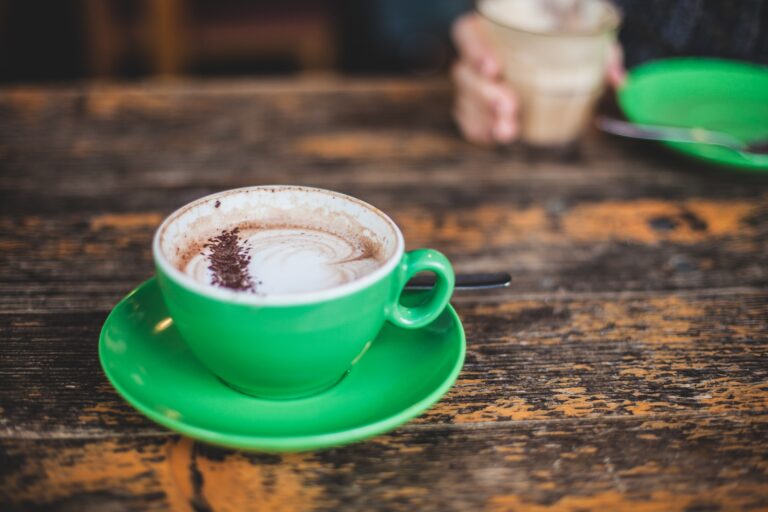Coffee has long been our faithful companion, helping us kick-start our mornings and fueling us through busy days. But have you ever thought about the profound impact coffee can have on our mental well-being? From those blissful moments of sipping a warm cup to its invigorating aroma, there’s something truly magical about this beloved beverage.
In this blog post, we delve into the fascinating world of coffee and uncover its surprising effects on our mental health. Get ready to embrace each mindful sip as we explore how coffee can enhance your mood, improve focus, and even promote relaxation. So sit back, grab your favorite mug, and let’s dive into an eye-opening journey where every sip becomes a moment of self-care for your mind!
Introduction to the topic and why it’s important

Coffee is one of the most widely consumed beverages in the world, with an estimated 500 billion cups being consumed every year. It’s not only a delicious and energizing drink, but it also has a long history of bringing people together and cultivating social connections. However, in recent years, coffee has gained attention for its potential impact on mental health.
In this article, we will explore the relationship between coffee and mental health – what research says about its effects on our mood, anxiety levels, and overall well-being. We will also delve into the concept of ‘mindful sipping’ and how practicing mindfulness while drinking coffee can have a positive influence on our mental state.
The connection between coffee and mental health
The connection between coffee and mental health has been a topic of interest for many years, with conflicting opinions and research on its effects. Some argue that caffeine consumption can have negative impacts on mental health, while others point to the potential benefits it may provide. In this section, we will explore the current understanding of how coffee affects our mental well-being.
Caffeine, the active ingredient in coffee, is a stimulant that works by blocking the neurotransmitter adenosine in our brain. This results in increased alertness and energy levels. However, too much caffeine can also lead to symptoms such as anxiety, restlessness, irritability, and difficulty sleeping – all of which can have a negative impact on our mental state.
But does this mean that coffee is bad for our mental health? Not necessarily. Just like with any substance, moderation is key when it comes to caffeine consumption. Studies have shown that consuming up to 400mg (equivalent to about four cups) of caffeine per day is generally considered safe for most healthy adults. However, everyone’s tolerance level may differ and it’s important to be mindful of your own limits.
Moreover, some research suggests that moderate caffeine intake may actually have positive effects on aspects of mental health such as mood regulation and cognitive function. A study conducted by Harvard School of Public Health found that drinking two or three cups of caffeinated coffee per day was associated with lower rates of depression among women.
The benefits of coffee on mood and cognitive function
Coffee is the go-to morning pick-me-up for many people around the world, but its benefits extend far beyond just keeping us awake. Studies have shown that coffee has a significant impact on mood and cognitive function, making it a potential ally in promoting overall mental wellness.
One of the main ways coffee can positively affect our mood is through its caffeine content. Caffeine acts as a stimulant, increasing alertness and enhancing our sense of well-being. It does this by binding to adenosine receptors in the brain, preventing the hormone from making us feel tired. This results in increased energy and a decrease in fatigue, helping to improve our overall mood.
In addition to its effects on alertness, coffee also contains several compounds that are known to boost levels of neurotransmitters such as serotonin and dopamine. These chemicals play important roles in regulating mood and happiness, so higher levels can lead to an uplifted state of mind and improved emotional well-being.
Tips for incorporating coffee mindfully into your daily routine
In today’s fast-paced world, many of us rely on coffee to kickstart our day and keep us going throughout. While this caffeinated beverage can provide a much-needed boost of energy, it’s important to incorporate it mindfully into your daily routine for the sake of your mental health.
Here are some tips for incorporating coffee mindfully into your daily routine:
1] Set an intention: Before reaching for that cup of coffee in the morning, take a moment to set an intention for why you’re drinking it. Is it simply for the taste and enjoyment? Or do you need a quick pick-me-up? Setting an intention can help remind you to be mindful while consuming your coffee and prevent mindless consumption.
2] Be aware of how much caffeine you’re consuming: It’s no secret that caffeine is a stimulant that can have both positive and negative effects on our mental health. Too much caffeine can lead to increased anxiety, restlessness, and disrupted sleep patterns. Be mindful of how much caffeine you’re consuming in a day and try not to exceed 400mg (about 4 cups) per day.
3] Pay attention to the quality of your coffee: Instead of just grabbing any old cup of joe, pay attention to the quality of your coffee. Choose organic or fair trade options whenever possible as they tend to be healthier for both people and the environment. You may also want to explore different roasting processes and determine which one works best for you.
4] Practice gratitude: As you prepare your coffee, take a moment to express gratitude for the experience. Whether it’s for the warm cup of comfort on a cold morning or the opportunity to connect with friends over a latte, expressing gratitude can help you savor and appreciate your coffee more.
5] Take breaks from caffeine: It’s essential to give your body a break from caffeine every once in a while. Consider having one or two days per week where you don’t consume any caffeine, or try switching to decaf occasionally.
6] Avoid using coffee as a crutch: While it can be tempting to rely on coffee as an energy booster throughout the day, try not to use it as a crutch for productivity. Instead, focus on getting enough rest and fueling your body with whole foods that will provide long-lasting energy.
7] Substitute with other drinks: If you find yourself reaching for multiple cups of coffee throughout the day, try substituting with other drinks such as herbal teas or green juice. This can provide a healthier alternative and reduce your overall caffeine intake.
Alternative drinks for those sensitive to caffeine
There are many people who struggle with their mental health and also experience sensitivity to caffeine. For these individuals, the popular choice of coffee may not always be the best option. However, there are some alternative drink options that can provide similar benefits without the negative side effects of caffeine. In this section, we will explore some mindful drink alternatives for those who are sensitive to caffeine.
1] Herbal tea: Herbal teas are a great option for those who want a warm and comforting drink without caffeine. They can offer a range of flavors and calming properties that can help ease anxiety or stress. Chamomile tea, in particular, has been widely studied for its ability to promote relaxation and improve sleep quality.
2] Decaffeinated coffee: If you still enjoy the taste of coffee but want to avoid the effects of caffeine, decaffeinated coffee is a good alternative. It contains very little caffeine (usually less than 5mg per cup) and provides a similar flavor profile as regular coffee.
3] Matcha green tea: Matcha is made from ground green tea leaves and has gained popularity in recent years due to its high antioxidant content and potential health benefits such as improved focus and attention. Unlike regular green tea which contains caffeine, matcha is made using a special process that reduces bitterness while preserving the beneficial compounds.
4] Golden milk: This traditional Indian drink is made from warmed milk mixed with turmeric, ginger, cinnamon, black pepper, and other spices depending on personal preference. The combination creates an earthy and soothing drink that can help reduce inflammation in the body and promote relaxation.
5] Kombucha: Kombucha is a fermented tea beverage that contains probiotics, enzymes, and various vitamins and minerals. It has been associated with improved gut health, digestion, and immune function. However, it does contain a small amount of caffeine due to the tea base, so it may not be suitable for individuals who are extremely sensitive to caffeine.
6] Fruit-infused water: If you’re looking for a refreshing and hydrating drink without caffeine or added sugars, fruit-infused water is a great choice. Simply add your favorite fruits (such as berries, citrus slices, or herbs) to a pitcher of water and let it steep for a few hours for a flavorful treat.
It’s important to note that everyone’s sensitivity to caffeine is different, so it’s best to experiment with these alternatives and find what works best for you. Also, be mindful of other sources of caffeine in your diet such as chocolate or certain teas and sodas. Consulting with a healthcare professional can also help determine if you have a specific sensitivity to caffeine or other ingredients that may be causing negative effects on your mental health.
Conclusion
As we can see, coffee has a significant impact on mental health in both positive and negative ways. While it may provide an immediate boost in mood and productivity, excessive consumption or dependency can lead to negative effects.
However, with mindful sips and moderation, we can fully enjoy the benefits of coffee while also being aware of its potential impact on our mental well-being. So next time you reach for that cup of joe, remember to stay mindful and listen to your body’s signals. After all, balance is key when it comes to taking care of our mental health.







